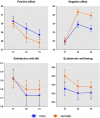Changes in values and well-being amidst the COVID-19 pandemic in Poland
- PMID: 34525095
- PMCID: PMC8443041
- DOI: 10.1371/journal.pone.0255491
Changes in values and well-being amidst the COVID-19 pandemic in Poland
Abstract
COVID-19 caused a global change in the lifestyles of people around the world. It provided a unique opportunity to examine how external circumstances impact two crucial aspects of functioning relating to "who I am" (values) and "how I feel" (well-being). Participants (N = 215) reported their values and subjective and eudaimonic well-being, nine months before the first lockdown in Poland and two weeks and four weeks into the first lockdown. We observed increased valuing of self-direction, security, conformity, humility, caring, and universalism and a decrease in valuing hedonism. Individuals experienced decreased subjective and eudaimonic well-being, with women responding with stronger negative affect intensity relative to men. Finally, we identified that individuals who were more open to change before the COVID-19 pandemic responded with higher eudaimonic well-being two weeks into lockdown relative to their less open to change peers. This study is unique in that it shows that well-being and individually held values are flexible and adaptive systems that react to external circumstances such as global critical events.
Conflict of interest statement
The authors have declared that no competing interests exist.
Figures


References
-
- Inglehart R, Baker WE. Modernization, Cultural Change, and the Persistence of Traditional Values. Am Sociol Rev 2000;65(1):19. doi: 10.2307/2657288 - DOI
-
- Veenhoven R. Is Happiness a Trait?: "Tests of the Theory that a Better Society Does Not Make People Any Happier". Soc Indic Res 1994;32(2):101–60.
-
- Schwartz SH. An Overview of the Schwartz Theory of Basic Values. Online Readings in Psychology and Culture 2012;2(1). doi: 10.9707/2307-0919.1116 - DOI
Publication types
MeSH terms
LinkOut - more resources
Full Text Sources
Medical

